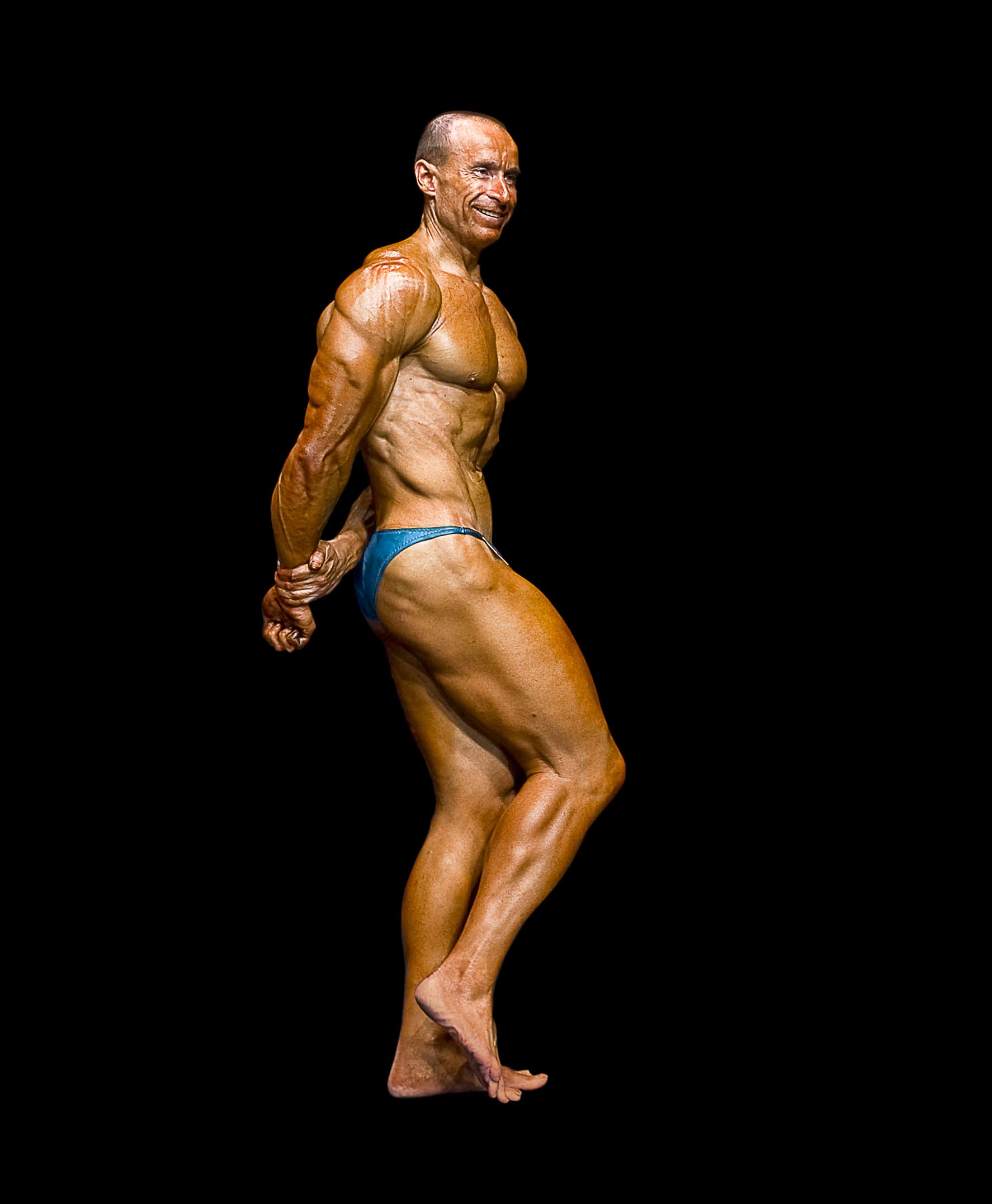
The Great Importance of Sleep for More Muscle and Strength Gains, and Better Health: Part 1
Mark Houghton (above), one of HARDGAINER 2.0's every-issue authors and a lifetime drug-free bodybuilder. Between 2007 and 2009, he was competing in bodybuilding shows whilst working shifts. His impaired sleep had a negative effect on his training and physique. By 2010, he was back on a regular work and sleep pattern. He believes his much-improved sleep contributed to his improved physique shown here, at age 47, in Manchester, England, 2012, at the British Natural Bodybuilding Federation’s British Championships, where he won the Overall Masters’ Champion.
This article isn’t on resistance training, but on other critical matters you must get right if you want bodybuilding and strength training success. Otherwise, you could do a great job in the gym, but still make little or no progress. Such is the great importance of sleep.
An exaggerated focus on training routines, and the endless chopping and changing of them, are at the root of the lack of progress most trainees endure.
Of course, if you’re on a terrible training routine, nothing you can do out of the gym (as a natural bodybuilder or lifter) will make that routine work.
So, it’s essential you’re on a routine that has the potential to be effective when properly applied. See my previous article in this column— “Abbreviated Training: the godsend for muscle & strength gains”—for the background on how drug-free, genetically typical bodybuilders and lifters should train.
But it’s essential you have a healthy hormonal system so that you’re able to train hard on a good routine, recover well, and not have your potential for muscle and might compromised by hormonal shortcomings. And that’s where the importance of sleep comes in.
You must sleep well on a consistent basis. That means at least seven hours each night; and better still, at least eight hours, especially if you’re training hard.
Improved sleeping won’t just improve your hormonal system, training, and recovery ability. It will also improve your energy level, mood, patience, relationships, and creativity.
The wake-up call
Lest you think I’m overstating the importance of sleep . . .
Reading the book Why We Sleep: The New Science of Sleep and Dreams in 2017 was an epiphany for me. Finally, I really started taking my sleep seriously. Author Dr. Matthew Walker is a neuroscientist and sleep scientist. He was a Professor of Psychiatry at Harvard Medical School and later became Professor of Neuroscience and Psychology at the University of California. He has over 20 years of sleep research to back up his conclusions and recommendations.
Does Dr. Walker follow his own advice? Yes!
“I take my sleep incredibly seriously because I have seen the evidence. Once you know that after just one night of only four or five hours’ sleep, your natural killer cells—the ones that attack the cancer cells that appear in your body every day—drop by 70%, or that a lack of sleep is linked to cancer of the bowel, prostate and breast, or even just that the World Health Organization has classed any form of night-time shift work as a probable carcinogen, how could you do anything else [but take sleep incredibly seriously]?”
Understand the hormonal considerations
The hormones that are affected by insufficient quantity and/or quality of sleep include the four key anabolic ones: growth hormone, testosterone, insulin-like growth factors (IGFs), and insulin.
Sustained poor sleeping hinders the secretion of the anabolic hormones, which would seriously undermine your progress in bodybuilding and strength training. Furthermore, the sustained poor sleeping would impair your brain function, negatively affect your body composition, weaken your bone density, increase your risk of obesity, and be a risk factor for diabetes.
So, getting sufficient quantity of good quality sleep on a consistent basis goes a long way to enabling your body to regulate a healthy level of hormones—not just for bodybuilding and strength training, but for many critically important components of health.
Such is the importance of sleeping well consistently.
Furthermore, when you sleep well, you can train with greater effort and focus than when you’re in sleep deficit, and recover better.
And hard resistance training itself helps you to maintain a healthy level of anabolic hormones.
So, together, sleeping well and training well are vital for maintaining a healthy hormonal system.
Are you sleeping adequately? Let’s find out.
For five consecutive days, stop all caffeine consumption after midday—be it from coffee, tea, energy drinks, sports drinks, energy bars, coffee beans, guarana, caffeine pills, chocolate, or even some weight-loss supplements and diet drinks.
But don’t drive a vehicle in the afternoon or evening during the test, in case you nod off at the wheel!
Without post-midday caffeine, are you really alert and energetic until around an hour before your bedtime? That means no drowsiness whatsoever, even when you’re watching television or reading for a sustained period, or a passenger in a car, train, or plane.
But if you do get drowsy, you’re definitely not sleeping adequately, in terms of quantity and/or quality.
Although you may feel fine over the short term, if you use caffeine to give you an illusion of alertness, your insufficient sleeping will take an inexorable toll on your health, recovery ability, training, strength, and body composition.
YOUR 18-POINT PLAN FOR IMPROVING YOUR SLEEP
The recommendations aren’t merely my opinions, but are based on the dictates of human physiology. For the best results, apply the entire plan! Mess up just one of the recommendations and you could wreck the whole plan.
#1. Make a pivotal acceptance
Fully acknowledge the importance of sleep!
To sleep better, you’ll need to spend more time asleep, which means going to bed earlier and/or sleeping later. That extra sack time means you’ll have less time for other activities.
Don’t resent giving up some activities for your extra kip. Pick on nonessential activities. The rewards will be profound.
#2. Understand your biological clocks
Because it sets the timing of the processes that happen naturally during each 24 hours, your internal circadian master clock is fundamental to your physiology and behaviors. It produces a subset of biological clocks that’s responsible for the hormones, neurochemicals, and other substances related to wakefulness. Your circadian master clock also produces another group of hormones, neurochemicals, and other substances related to sleep.
The more you arrange your life so the timings of your activities fit your circadian clock, the better.
Today’s 24/7 stimulation from an electrically lit and digitally wired world fights your biological clocks, which confuses your physiology. Then your body doesn’t have the signals required to distinguish clearly between wakefulness and sleep, which encourages problems with sleeping.
Night owls are “evening people” who naturally prefer to get up late and go to bed late. And larks are “morning people” who naturally get up early and go to bed early. Generally, modern society suits larks better than night owls.
Varying your routine—for example, being a night owl from Friday PM until Sunday AM, and a lark from Sunday pm until Friday AM—creates physiological chaos that ruins your sleep-wakefulness cycle.
If you’re an extreme lark who prefers to get up at around 4:00 am and go to sleep at around 8:00 pm, for example, or an extreme night owl who prefers to go to sleep at around 2:00 am and get up at around 10:00 am, for instance, you may suffer greatly from trying to fit yourself into a “normal” sleep-and-rise schedule of around 10:30 pm until 6:30 am.
If you’re a night owl who tries to fit into a schedule suited to larks, you may be especially prone to heavy caffeine intake in the morning—to have sufficient energy to function then.
Night owls usually prefer to work afternoons and evenings, but larks usually prefer to work mornings and afternoons.
If you’re self-employed, or work remotely from home, you may be able to find your best schedule.
#3. Get sufficient exposure to daylight, especially first thing in the morning
The most important driver of circadian rhythms is bright light, especially in the morning. Spend at least some of each morning in a well-lit environment—preferably from natural light. This activates many chemical reactions that benefit your sleep-wakefulness cycle.
If there isn’t natural bright light in the mornings where you live, get a light therapy box (also called a light box, or phototherapy box), which mimics outdoor light.
But during the few hours before your bedtime, eliminate your exposure to bright light, to send one of the cues that sleep is nigh.
#4. Get sufficient physical activity
High levels of physical activity mean high energy output, which leads to evening drowsiness that makes falling asleep easy and promotes deep sleep. The physical activity can be demanding—hard physical training, for example—but mild activity such as daily easy walking is also valuable.
But avoid hard physical training within four hours or so of bedtime because such activity can make it difficult to fall asleep at your usual bedtime.
#5. Avoid caffeine after midday
Low-to-moderate caffeine consumption in the mornings—for example, two or three mugs of coffee or tea—can enhance your mood. Tea and coffee are also rich in polyphenols, which provide many health benefits.
After midday, to get polyphenols without caffeine, choose decaffeinated tea and coffee.
Because caffeine sensitivity varies greatly, and even decaffeinated products have a tiny amount of caffeine, a very few people can be affected by even that low level of caffeine, and heavily affected by regular caffeinated products. If you’re one of them, it may be best that you eliminate all caffeinated and decaffeinated products.
Next time: Part 2, the remaining 13 recommendations for how you can improve your sleep, and in turn improve your health, workouts, recovery ability, and progress in building muscle and might.
About the author
Stuart McRobert has been a voice of reason in the training world for 41 years and counting. He was first published in 1981, in IRON MAN magazine, when he was 22 years old, and has had over 1,000 articles published in US and European bodybuilding print magazines other than his own, including IRON MAN, FLEX, MUSCLE & FITNESS, and MUSCLEMAG INTERNATIONAL. He also published HARDGAINER print magazine for 15 years—from 1989 to 2004—and is the author of BRAWN, BEYOND BRAWN, BUILD MUSCLE LOSE FAT LOOK GREAT, and several other books.
But Stuart’s not an armchair coach. Drug-free, he built himself up from a skinny youth to 195 pounds and deadlifted 400 pounds for a set of 20 reps. And he still trains seriously today, at age 64.
Success stories from those who also use hard-gainer-style methods for their training and coaching include Marty Gallagher and Chuck Miller.
Stuart currently publishes HARDGAINER 2.0 digital magazine. Visit his website to get your FREE sampler issue: www.hardgainer.com


